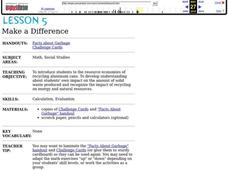Curated OER
Debris Dilemmas
Students examine debris, what it is, where it comes from and where they go. In this debris lesson students view a video, answer questions and discuss what they learned.
Curated OER
Don't Forget the Three R's
Students encourage one another in recycling. In this environment and art lesson, students create a new recycling bin that would help people in remembering to recycle.
Curated OER
Garbage Dump
Students are introduced to landfills and the importance of reducing garbage. In this Earth Day lesson, students collect garbage they find on the ground. They take it back to a plastic bin and attempt to bury all the garbage only to find...
Curated OER
Overpacking
In this packaging worksheet, learners compare the amount of small bags of popcorn to large bags of popcorn and how much trash they create for equal amounts of food. Students follow 6 directions and answer 2 questions.
Curated OER
What is Trash?
Young scholars consider what garbage is and where it ends up. In this recycling lesson, students read excerpts from Charlotte's Web and Stuart Little as they consider methods to reduce wastefulness.
Curated OER
There Is No Away
Students identify how trash is disposed of. In this environmental instructional activity, students read and discuss the poem "Sarah Sylvia Stout" by Shel Silverstein and discuss the ways people treated the items in the poem. Students...
Curated OER
A Load of Rubbish!
In this recycling worksheet, students read 2 fact sheets about what garbage, or "rubbish" as it is called in the worksheet, is made of. They then complete 2 activities and 1 project that is outlined on the second page.
Curated OER
The Rotten Truth
Fourth graders watch a video about how much solid waste is produced by each person and how it is disposed of. Using the internet, they identify and interpret data on the type of trash thrown out the most. They offer possible solutions...
Curated OER
Rate of Decomposition
Pupils experiment with the decomposition rate of garbage. They discover that environments are fragile and need to be protected and resources are not always used wisely. They then think about their own environment and then about the...
Curated OER
How Long Does Trash Last
Students work in cooperative groups to estimate how long trash lasts in a landfill. They study environmental consequences of not recycling and use graph-making software to create a graph that illustrates the lifespan of trash items...
Curated OER
Recycling: Causes of Pollution
Students read The Lorax by Dr. Seuss while focusing on similarities in their world and that of the Lorax by completing a worksheet. They examine the effects of pollution or garbage on the environment.
Curated OER
Discovering the Problem of Solid Waste
Learners catagorize the types of garbage from going through a trash can provided by their teacher. They then chart the items on a graph and propose a solution to reduce the amount of garbage.
Curated OER
Where Should It Go? Recycle? Compost? Incinerate? Landfill?
Students discuss what happens to trash after it is collected. They sort "clean" trash into groups depending on whether it should be recycled, incinerated, placed in a landfill, composted or if it is something we could avoid using.
Curated OER
Landfill Project
Students explore impact of garbage on environment, examine waste management operations and how they can directly impact environment, implement ways to lower household garbage, and make STELLA Model about garbage flow and use model to...
Curated OER
Consequences of Garbage
First graders consider the problem of too much garbage in America. In this garbage use activity, 1st graders discuss ways to decrease garbage in the United States and complete a coloring sheet.
Curated OER
Trash Or Treasure
Students investigate the concept of garbage and define how it may be useful for people. The consumption of products is estimated to predict the annual volume of garbage for a household. Then students attempt to create a treasure made...
Curated OER
It's in the Garbage
Students analyze how studying garbage relates to methods of archaeology. They examine garbage to determine things about their culture and relate that to prehistoric peoples.
Curated OER
Make a Difference
Students are introduced to the resource economies of recycling aluminum cans. They develop understanding about their own impact on the amount of solid waste produced and recognize the impact of recycling on energy and natural resources.
Curated OER
The Waste Paper Basket
Students examine the consequences of littering and creating garbage.
Curated OER
Trash...it really piles up!
Students investigate a contemporary "midden" by analyzing trash collected from various sources and determining life-style choices people make. They see that reducing the amount of waste we generate is helpful to the the environment.
Curated OER
Throw-Away Society
Students think about garbage disposal and the amount that we produce.
Curated OER
Reduce and Reuse
Students conduct a lunch waste audit by recording each item they throw away at lunch. They graph class lunch waste. They use this information to devise a plan of action to reduce lunch waste. There is also an activity to make paper.
Curated OER
Recycle
Students determine the weight of paper waste generated by the class. They brainstorm ways to reduce and recycle. They make their own paper to demonstrate recycling. This lesson is very effective in demonstrating how recycling works.
























